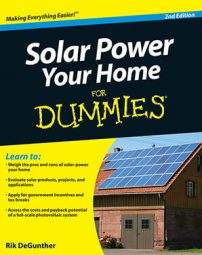Most photovoltaic (PV) customers are interested in solar powering their homes because they realize that solar power is good for the environment, among other things. Few other investments can positively impact the environment as much as an intertie (utility-connected) PV system. Here's a short list of PV system advantages:
Lower utility bills: The most obvious advantage of installing solar PV is that you'll reduce your electric utility bills. It's easy to determine how much your system will produce in terms of energy. It's a lot more difficult to predict how this will affect your monthly utility bill, and that's the bottom line.
Simplicity: The system architecture of a PV system, while considered high-tech, is very simple. There are no moving parts. The simplistic nature of PV systems means
Maintaining a PV system is simple. You usually don't need to do anything at all. While it may seem like your panels are getting very dusty, the affect on power output is much less than you'd think.
Simplicity ensures reliability. The systems have long lifetimes because there are no moving parts. You can expect your solar PV system to operate for more than 25 years.
In fact, no other alternative energy option affords the simplicity of a PV system.
Subsidies: Government has a vested interest in promoting solar power because of its overwhelmingly positive environmental impact, as well as the desirable political goal of energy independence. The best way to promote solar power, of course, is to get more people to invest in it, and the best way to do that is to subsidize it and drive the net costs down. (Net cost is the amount you pay, out of pocket, for your system; it's the starting price minus all the subsidies and rebates that you receive.)
Subsidies, rebates, and tax breaks are widespread, and they're becoming more prevalent every day. In some parts of the country, the total discount on a system cost can be more than 50 percent.
So should you buy now or wait? Although solar contractors inevitably tell you to buy now, the fact is, nobody knows where net costs are going. The only certainty is that utility power is going to become more expensive, and probably much more expensive. But because government incentives change so much, it's impossible to predict what the net cost of a system is going to do simply because it's impossible to predict what politicians are going to do. Net prices have come down in the last few years, particularly in light of the ITC (Investment Tax Credit) change. People who bought systems a few years ago have seen their neighbors install identical systems for thousands of dollars less.
Ultimately, you'll have to answer the timing question for yourself. Stay abreast of the changing laws by reading newspapers and magazines. You'll find literally thousands of alternative energy promotions being discussed by various government bodies, and any one of these can impact the net cost of a solar PV system.

